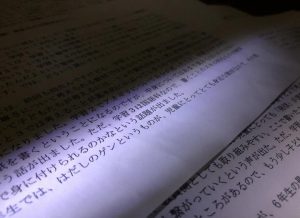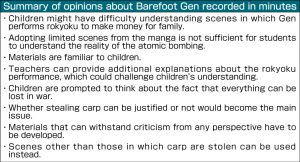Meeting minutes from councils show debate on deletion of Barefoot Gen from peace-education materials and final decision by Hiroshima board of education
Feb. 23, 2023
Review of materials highlights support, due to familiarity among children, and opposition, due to scenes describing theft of carp from pond
by Fumiyasu Miyano, Staff Writer
The Chugoku Shimbun has obtained the minutes of meetings of two councils established to deliberate making revisions to teaching materials used in the peace-education program in Hiroshima City public elementary schools based on the Hiroshima City’s Municipal Board of Education’s plans to delete the manga Barefoot Gen. Council members voiced mixed opinions both approving and opposing the manga, based on the notions that children are familiar with the materials and that adopting only certain scenes from the manga series is insufficient for understanding the reality of the atomic bombing. The minutes do not reveal evidence that the councils made the determination to delete the materials, but rather that the city’s board of education may have made the final decision.
The two councils, made up of university professors and school teachers, were a program ‘verification council’ (13 appointed members), established to discuss the need for program revisions in meetings during the period June 2019–February 2020, and a program ‘revision council’ (with seven appointed members), which discussed details of new materials in gatherings during August 2020–July 2022. The meeting minutes for the two councils total about 70 pages.
According to the minutes, one of the council members, an elementary school teacher, described difficulties in teaching Barefoot Gen in classes. “Children had a tough time understanding the scenes in which the protagonist Gen performs rokyoku (recitation of stories accompanied by shamisen) to make money for his family. Adopting certain scenes from the manga isn’t sufficient for students to understand the reality of the atomic bombing, so I would sometimes use a separate picture-story show to facilitate their understanding.”
Another elementary school teacher, however, gave high marks to that part of the story. “Children are familiar with the materials, and the format makes it easy to express those ideas. Teachers can provide additional explanations about the rokyoku performance, which by itself might be hard to understand. With the materials, I think students can learn to consider their own families and contemplate the fact that everything can be lost in war.”
“Scenes might be misleading”
As for why Barefoot Gen was deleted from the teaching materials, the board of education has explained that scenes in which Gen performed rokyoku on the street to make money to support his family and stole Japanese carp from a pond for his pregnant mother to eat were debated in the meetings by the council members. However, some of the members argued that the information did not match the lives currently experienced by children and that “the scenes could be misleading.”
One council member said, “The verification council didn’t debate whether the work itself was right or wrong” but simply raised issue with the scene in which Gen stole carp from the pond. “Whether stealing carp was or was not justified would become the focal point. We have to develop teaching materials that can withstand criticism from any perspective,” said the member. In response to that opinion, another council member argued, “Different scenes could certainly be used instead.”
Regarding other teaching materials for senior high school students that introduce the late Keiji Nakazawa, author of Barefoot Gen, a junior high school principal who served as a council member wondered whether criticism about the materials came from the public. A board of education official explained that, “We apparently received criticism when we decided to incorporate Barefoot Gen (as part of the teaching materials), but we haven’t heard any negative opinions about Mr. Nakazawa himself.”
Peace-education program began in fiscal 2013
The city’s board of education initiated the peace-education program at all city public elementary schools, junior high schools, and senior high schools starting in fiscal 2013. Scenes from Barefoot Gen were adopted as teaching materials for third-year elementary school students based on its focus on the bonds of family. The councils’ deliberations represented the first time the peace-education materials were reviewed since the start of the program. Based on the deliberations at the verification council meetings, a working group composed of teachers at city public schools and city board of education workers developed a draft for new teaching materials. Feedback on the draft was gathered at the program revision council’s meetings, and the draft underwent repeated modification. The minutes revealed that no objections were ultimately raised at the revision council to the plan for using the new materials, without the scenes from Barefoot Gen, starting in fiscal 2023.
An official at the Hiroshima City Municipal Board of Education’s Guidance Section 1 said, “We worked to revise the peace-education program based on a policy that all issues raised by the verification council members, not limited to excerpts from Barefoot Gen, were to be revised. The board of education is not rejecting the manga itself.”
(Originally published on February 23, 2023)









